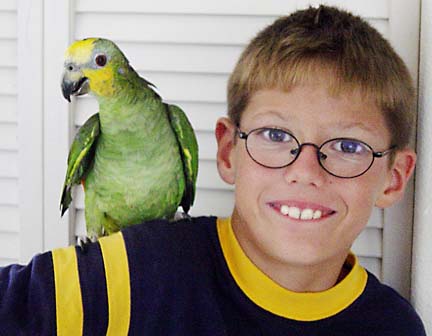
[ PET OHANA ]

|
Some animals need
foster parents, too
The Hawaiian Humane Society's foster-care programs depend on volunteers who open their homes to assist others. Foster families nurse the ill back to health, socialize the young and help animals when their owners cannot. The outcome of fostering pets is always a happy one -- the reunion of pets with their owners or the successful adoption of these animals to new families.
Sudden military deployments have forced many of Hawaii's servicemen and women to leave behind their beloved pets. In response to these trying times, the Humane Society created Pets of Patriots last year. This program pairs members of the military with community volunteers willing to foster their pets during their deployment. Pets of Patriots gives Armed Forces personnel another option, one that allows them to return home at the end of their tour to their furry or feathered friends.
Currently, there are about 60 community volunteers eager to do their part to support the Armed Forces. These volunteers foster dogs, cats, birds and any other pets left behind. The Humane Society connects the pet owner and the fostering family and provides them with sample foster-care agreements, a pet health report and pet profile. This helps the fostering family become acquainted with the pet's preferred food, toys and health requirements. All pet expenses, including any veterinary care, are the responsibility of the owner.
NANCY KAPITAN, a community volunteer whose family is also in the military, understands the hardships faced when deployment separates people from their cherished companion animals. She has been fostering a bird named Kammy whose owner was deployed this spring. Kammy's mom is stationed in Afghanistan for a year, but the distance does not stop her from seeing her feathered friend.
"We e-mail her pictures all the time," Kapitan said. "It's great to expose my boys to this. I've been around birds before, but they've never experienced one." Although this may not be for everyone, Kapitan suggests people consider becoming foster-care volunteers. Despite already having a small, mixed breed dog and a cat of her own, Kapitan thinks fostering Kammy has been a powerful experience for her and her family.
"We've had a lot of requests from soldiers who are preparing for deployment," said Kelli Nitahara, Hawaiian Humane Society outreach programs coordinator. "When we can place their pets in foster homes, they have greater peace of mind while they're away on duty."
There is still a great need for volunteers capable of fostering all types of pets, especially large breed dogs and birds, Nitahara said. It is difficult to find homes willing to take in these pets. "We serve as a matchmaker for the people in the military and foster families. We do the best we can to find the perfect temporary homes for the animals left behind," she added.
A related service offered by the Humane Society is its Foster Care program. Humane Society volunteers care for the shelter's orphaned, sick or injured animals until they are mature or are healthy enough for adoption. From 2003 to 2004, there was an 18 percent increase in animals benefiting from foster care, illustrating how essential foster care can be.
Fostering can last from a few days to several months. It is mandatory that foster-care providers attend a general orientation and training session.
When fostering young or sick animals, the foster family will be provided with necessary materials such as food, kitty litter and medicine. Volunteers must provide their own newspaper and towels and must have an overwhelming amount of love, time and dedication.
"We need more foster care providers who will take in young puppies and feline moms with large litters," Nitahara said. "These young ones can be very demanding but the rewards of watching them grow are worth it. Last year, there were 446 cats and kittens, 247 dogs and puppies and 21 other small animals that were nurtured and cared for by foster families. With the help of these compassionate individuals, more animals can grow up healthy and socialized. They make excellent pets when they have been lovingly raised during the first vital stages of their lives."
These two Humane Society programs can make a difference in the lives of people and pets. For more information, please contact Nitahara at 946-2187, ext. 217.
www.hawaiianhumane.org

Click for online
calendars and events.